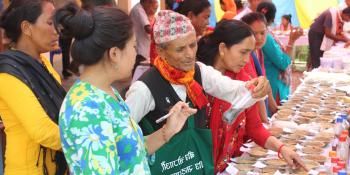Creating future scenarios to inform new environment policy in Tanzania
Policy-makers, researchers, and development practitioners will meet on 16 – 17 February in Morogoro, Tanzania to jointly develop future socio-economic scenarios.
Socio-economic and climate scenarios will help review the new Environment Policy of Tanzania, through identifying and addressing any potential gaps in the new policy.
This workshop is organized by the Policy Action and Climate Change Action (PACCA) project and University of Oxford Environmental Change Institute (ECI). The PACCA project was launched last year, and aims at informing and linking policies and institutions for the development and adoption of climate-resilient food systems in Uganda and Tanzania. The project is led by the International Institute of Tropical Agriculture (IITA) as a part of the CGIAR Research Program on Climate Change, Agriculture and Food Security (CCAFS) Flagship on "Policies and Institutions for climate-resilient food systems".
Tanzania's current National Environment Policy has been active since 1997 and is not as responsive to emerging environmental issues as in the past. The new challenges include climate change, biofuel, and genetically modified organisms as well as invasive alien species and electronic equipment waste. Therefore, the Tanzanian Government, through the Vice President’s Office, has initiated a comprehensive review of the policy.
The participatory socio-economic and climate scenarios activities, a project under CCAFS and Oxford University, will be developed and used to help analyze and inform the ongoing review process.
The participants will create future scenarios for areas that include environment and ecosystem, agriculture and land use, industry and services, socio-economic issues and health, science, innovation and resilience.
Participants at the workshop will be from the Vice President’s Office, Prime Minister’s Office, Ministries of Agriculture, of Livestock and Fisheries Development, Natural Resources and Tourism, Water, Health and Community Welfare, Transport, and Education and Vocational Training. Also present were representatives from the National Environmental Council (NEMC), the Universities of Sokoine and Ardhi, and the International Centre for Tropical Agriculture (CIAT).
The workshop will make recommendations for the policy, which it is anticipated to be finalized in June this year. A similar meeting will be held in Uganda, 19 – 20 February.
Learn more: Scenarios activities


